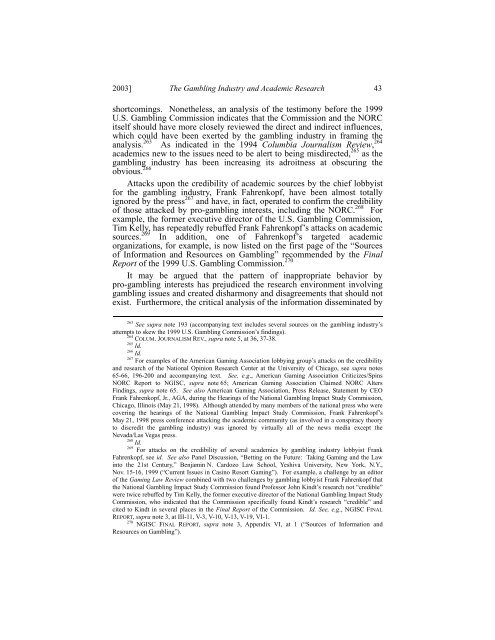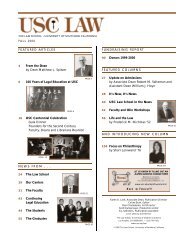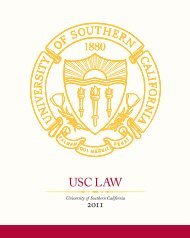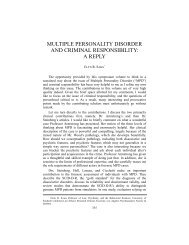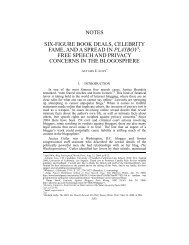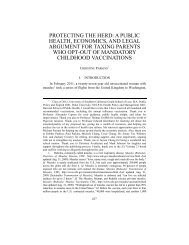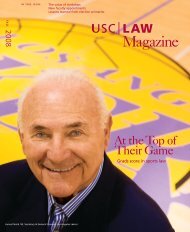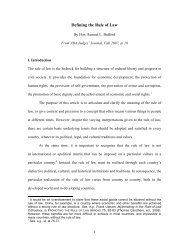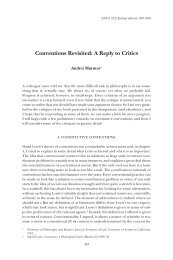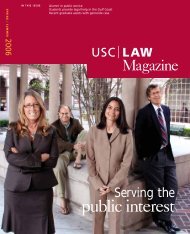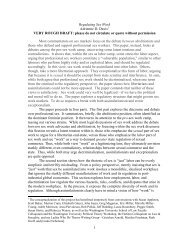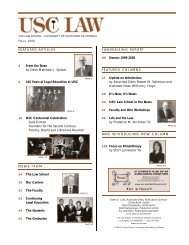REIFICATION IN LAW AND LEGAL THEORY - USC Gould School of ...
REIFICATION IN LAW AND LEGAL THEORY - USC Gould School of ...
REIFICATION IN LAW AND LEGAL THEORY - USC Gould School of ...
You also want an ePaper? Increase the reach of your titles
YUMPU automatically turns print PDFs into web optimized ePapers that Google loves.
2003] The Gambling Industry and Academic Research 43<br />
shortcomings. Nonetheless, an analysis <strong>of</strong> the testimony before the 1999<br />
U.S. Gambling Commission indicates that the Commission and the NORC<br />
itself should have more closely reviewed the direct and indirect influences,<br />
which could have been exerted by the gambling industry in framing the<br />
analysis. 263 As indicated in the 1994 Columbia Journalism Review, 264<br />
academics new to the issues need to be alert to being misdirected, 265 as the<br />
gambling industry has been increasing its adroitness at obscuring the<br />
obvious. 266<br />
Attacks upon the credibility <strong>of</strong> academic sources by the chief lobbyist<br />
for the gambling industry, Frank Fahrenkopf, have been almost totally<br />
ignored by the press 267 and have, in fact, operated to confirm the credibility<br />
<strong>of</strong> those attacked by pro-gambling interests, including the NORC. 268 For<br />
example, the former executive director <strong>of</strong> the U.S. Gambling Commission,<br />
Tim Kelly, has repeatedly rebuffed Frank Fahrenkopf’s attacks on academic<br />
sources. 269 In addition, one <strong>of</strong> Fahrenkopf’s targeted academic<br />
organizations, for example, is now listed on the first page <strong>of</strong> the “Sources<br />
<strong>of</strong> Information and Resources on Gambling” recommended by the Final<br />
Report <strong>of</strong> the 1999 U.S. Gambling Commission. 270<br />
It may be argued that the pattern <strong>of</strong> inappropriate behavior by<br />
pro-gambling interests has prejudiced the research environment involving<br />
gambling issues and created disharmony and disagreements that should not<br />
exist. Furthermore, the critical analysis <strong>of</strong> the information disseminated by<br />
263<br />
See supra note 193 (accompanying text includes several sources on the gambling industry’s<br />
attempts to skew the 1999 U.S. Gambling Commission’s findings).<br />
264<br />
COLUM. JOURNALISM REV., supra note 5, at 36, 37-38.<br />
265<br />
Id.<br />
266<br />
Id.<br />
267<br />
For examples <strong>of</strong> the American Gaming Association lobbying group’s attacks on the credibility<br />
and research <strong>of</strong> the National Opinion Research Center at the University <strong>of</strong> Chicago, see supra notes<br />
65-66, 196-200 and accompanying text. See, e.g., American Gaming Association Criticizes/Spins<br />
NORC Report to NGISC, supra note 65; American Gaming Association Claimed NORC Alters<br />
Findings, supra note 65. See also American Gaming Association, Press Release, Statement by CEO<br />
Frank Fahrenkopf, Jr., AGA, during the Hearings <strong>of</strong> the National Gambling Impact Study Commission,<br />
Chicago, Illinois (May 21, 1998). Although attended by many members <strong>of</strong> the national press who were<br />
covering the hearings <strong>of</strong> the National Gambling Impact Study Commission, Frank Fahrenkopf’s<br />
May 21, 1998 press conference attacking the academic community (as involved in a conspiracy theory<br />
to discredit the gambling industry) was ignored by virtually all <strong>of</strong> the news media except the<br />
Nevada/Las Vegas press.<br />
268<br />
Id.<br />
269<br />
For attacks on the credibility <strong>of</strong> several academics by gambling industry lobbyist Frank<br />
Fahrenkopf, see id. See also Panel Discussion, “Betting on the Future: Taking Gaming and the Law<br />
into the 21st Century,” Benjamin N. Cardozo Law <strong>School</strong>, Yeshiva University, New York, N.Y.,<br />
Nov. 15-16, 1999 (“Current Issues in Casino Resort Gaming”). For example, a challenge by an editor<br />
<strong>of</strong> the Gaming Law Review combined with two challenges by gambling lobbyist Frank Fahrenkopf that<br />
the National Gambling Impact Study Commission found Pr<strong>of</strong>essor John Kindt’s research not “credible”<br />
were twice rebuffed by Tim Kelly, the former executive director <strong>of</strong> the National Gambling Impact Study<br />
Commission, who indicated that the Commission specifically found Kindt’s research “credible” and<br />
cited to Kindt in several places in the Final Report <strong>of</strong> the Commission. Id. See, e.g., NGISC F<strong>IN</strong>AL<br />
REPORT, supra note 3, at III-11, V-3, V-10, V-13, V-19, VI-1.<br />
270<br />
NGISC F<strong>IN</strong>AL REPORT, supra note 3, Appendix VI, at 1 (“Sources <strong>of</strong> Information and<br />
Resources on Gambling”).


